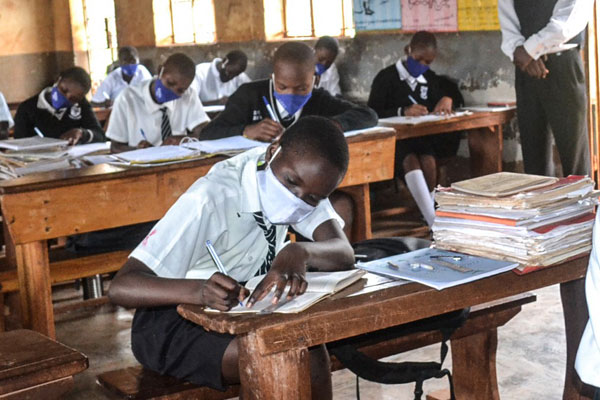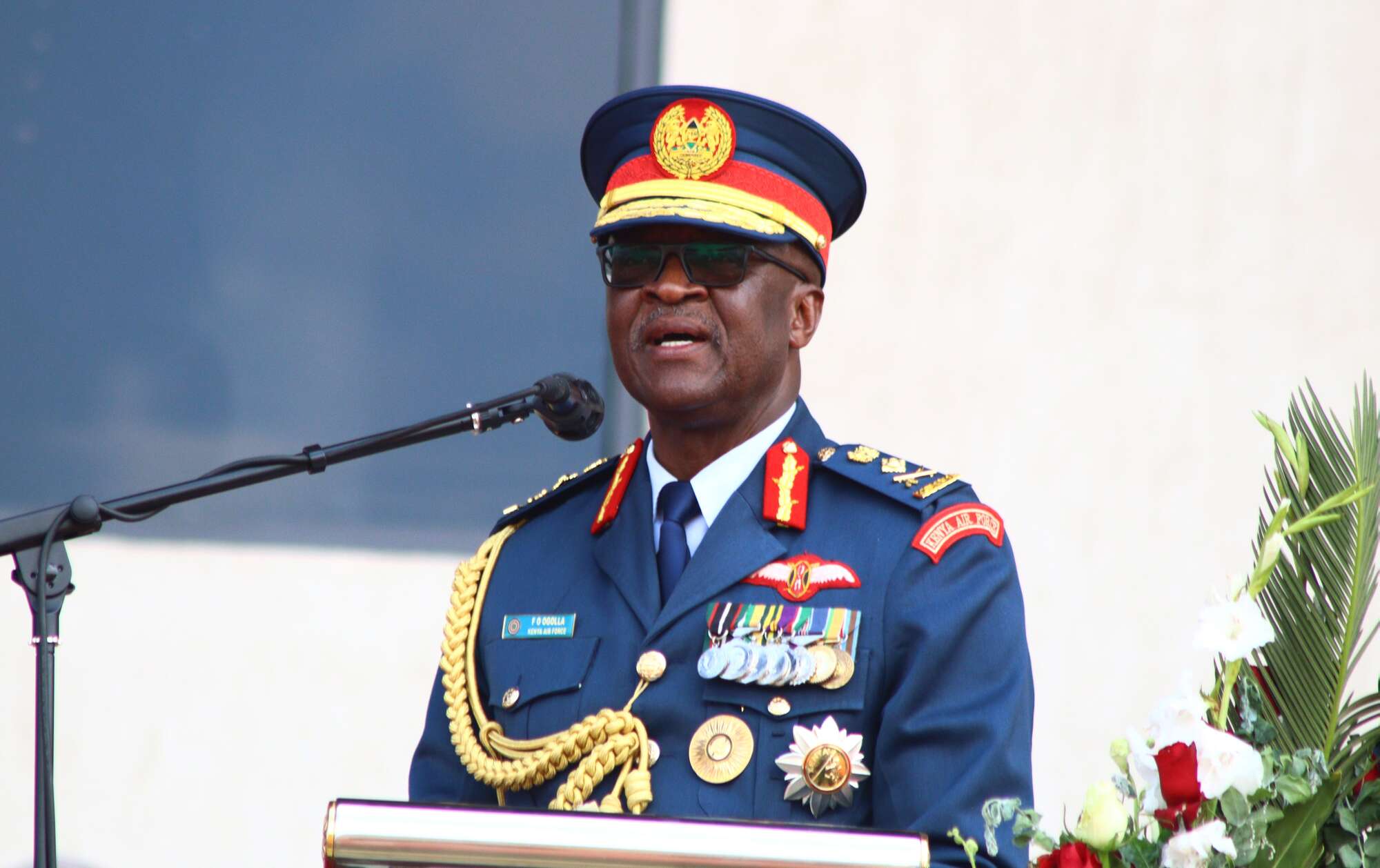Can govt-aided schools run without extra fees?

Pupils of Main Street Primary School in Jinja City attend a lesson on November 17. Education experts have questioned the practicability of President Museveni’s proposal to scrap the payment of fees in USE and UCE institutions. PHOTO BY DENIS EDEMA
What you need to know:
As 2021 campaigns continue across the country, President Museveni has promised to scrap all fees in UPE and USE institutions. But experts warn that the move may not be practical?
“In those countries [where there is free education], there are restrictions on parents such as limiting number of births. Are we ready for that? The challenge that UPE faces is that it is based on false promises that made some parents give up on supporting their children in school,” Prof Anthony Mugagga, the director of Makerere University Institute of Education Research
“It is possible to scrap those charges because this country has money. But politics has spoilt parents. They are no longer paying school fees. It is a hustle to collect money from parents. If government is scrapping to add more facilitation to schools, then it is so good. But if they don’t increase, the education will collapse,” Samson Higenyi, head teacher of Butaleja Secondary School
Can govt-aided schools run without extra fees?
BY TONNY ABET
Educationists have questioned the practicability of President Museveni’s proposal to scrap all the fees that schools charge parents under universal primary and secondary education.
The educationists described the promise as unrealistic and only calculated to achieve election purposes.
They said government has failed to provide adequate capitation grants to cover school budget deficits, adding that without the additional funding from parents, there will be no effective teaching or learning.
In his manifesto, Mr Museveni noted that although 10.7 million children are enrolled in primary education, only two million continue to secondary schools. He attributed the high dropout to reintroduction of school charges in government-aided schools.
“There is this issue of school fees. I earlier told your leaders that I don’t believe in school fees for primary, secondary, and technical schools. When I introduced Universal Primary Education (UPE), my plan was to give free education,” the President said while campaigning in Apac District last week.
However, Prof Anthony Mugagga, the director of Makerere University Institute of Education Research, told Daily Monitor that such promises only create false hope.
“Free education is not practical. It is unrealistic to say they can have free secondary or primary education in the country. Has our economy achieved the status to be like China or Korea?” Prof Mugagga asked.
“In those countries [where there is free education], there are restrictions on parents such as limiting number of births. Are we ready for that? The challenge that UPE faces is that it is based on false promises that made some parents give up on supporting their children in school,” he added.
Prof Mugagga said such a proposal will only create more irresponsible parents.
“If someone says government will meet 50 per cent of the costs, then it could be relevant but if you scrap off school fees, then you will be telling people who enjoy producing without being responsible to keep doing so,” he added.
Government spends Shs1.2 trillion on UPE and Shs800 billion on Universal Secondary Education (USE).
Unesco report
A 2014 United Nations Educational, Scientific and Cultural Organisation (Unesco) report titled, ‘The use and usefulness of school grants; Lessons from Uganda,’ indicated that capitation grants for UPE are insufficient.
“The grant is insufficient to cover school budgets. Its disbursement also suffers from many delays,” the report said.
The research established that many parents currently believe everything linked to school attendance should be free, including lunch.
According to the capitation grant expenditure guidelines, government allocates Sh7,560 for each child per term and 50 per cent of this amount (Shs3,780) is meant to be spent on instructional materials such as chalk, textbooks and others.
Thirty per cent of the money is spent on co-curriculum activities such as football and athletics while the rest is spent on school management, contingency and the head teacher’s transport.
An assessment in 2018 by Education Partnerships Group (EPG), indicates that private owned secondary schools and institutions that are implementing USE receive government capitation grant of Shs47,000 per student per term for O-Level and Shs85,000 per student per term for those in A-Level.
Government schools receive slightly less per student, Shs41,000 for students in O-Level and Shs80,000 for A-Level.
Prof John C. S. Musaazi, a lecturer at Makerere University College of Education, said proposing to scrap all school charges is exploiting ignorance of illiterate voters.
“In semi-illiterate society like Uganda, democracy cannot be practiced because voters are bulldozed. You buy them sugar and salt and they vote you. Democracy is about ideas but not about giving money. The promises should be realistic and not things that are not practical,” Prof Musaazi said.
The expert said the government actions have left educationists with more challenges than solutions.
“How do you introduce computer education when there is no electricity in majority of schools in the country? A number of schools lack basic facilities such as classrooms and accommodation for teachers,” he said.
Prof Musaazi said such scrapping of all fees can only work if schools in Kampala have same facilitation like their upcountry counterparts.
Head teachers react
Ms Rhoda Nalunkuuma, the head teacher of Kyampagi Primary School in Rakai District, told Daily Monitor that scrapping all the charges would have devastating effects on the academic performance.
“In first term, we received the capitation grant of Shs2.5m and we have 450 pupils. Parents have agreed to pay school development fees, which is used to cater for lunch for pupils and teachers, maintenance of school facilities and help us organise periodic examination tests for pupils. Children who are catered for well perform better in their studies,” Ms Nalunkuuma said.
Given that 50 per cent of this capitation grant is spent on scholastic materials and 30 per cent on extracurricular activities, this translated into Shs2m. This means the school administration remains with only Shs500,000 to maintain the school, prepare exams, pay head teacher’s transport and contingency occurrences for three months of the term.
Mr Samson Higenyi, the head teacher of Butaleja Secondary School, said government can scrap fees but only if it increases the amount of money allocated to each learner per term.
“It is possible to scrap those charges because this country has money. But politics has spoilt parents. They are no longer paying school fees. It is a hustle to collect money from parents. If government is scrapping to add more facilitation to schools, then it is so good. But if they don’t increase, the education will collapse,” Mr Higenyi said.
Achievements of universal education
The 2018 National Planning Authority (NPA) report says government’s investment in free primary education has led to improved access and doubled the average years of schooling. But quality of teaching has declined.
“Enrolment figures doubled from 2.6 million in 1995 before UPE to 5.3 million in 1997 after the introduction of UPE. This enrolment further increased to 7.6 million pupils in 2003 and 8.7 million in 2017,” the report read.
It added: “However, it is important to note that Uganda’s performance in literacy and numeracy is still low compared to the East African countries, particularly in rural government-owned schools.”
According to the EPG report, in 2007 when the USE programme was launched, 363 private providers of low-cost secondary education in 314 sub-counties which had no government-aided school, joined the programme. They enrolled around 40,5957 Senior One students. Only Senior One was eligible in the first intake.
Since then, the programme has grown to 800 private schools. In 2016, these schools enrolled more than 460,000 students, which represented 46.2 per cent of those students enrolled under the USE programme, and 32 per cent of all students enrolled in secondary school.
NPA report
A 2018 report by National Planning Authority (NPA) titled Financing and Costing UPE reiterated that UPE is failing to meet efficiency because of limited resources in schools.
“This is explained by the government-aided schools being away from the possible maximum outcome by 0.38 per cent compared to their private schools counterparts at 11.8 per cent. This implies that for government to improve learning outcomes, it should increase financing to the primary school sector,” the report states.



